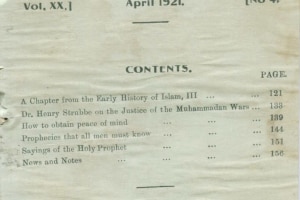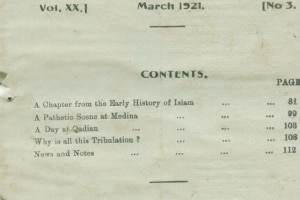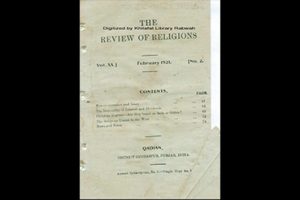
The April 1921 edition of The Review of Religions was full of scholarly and faith-inspiring articles. The first article of the April issue was the translation of an address given by His Holiness, Hazrat Mirza Bashiruddin Mahmud Ahmad (ra), Second Successor of the Promised Messiah (as), to the Martin Historical Society at the Islamia College Hall Lahore on 26 February 1919. Causes of dissention in the early Muslims was an extremely significant lecture because it dealt with a particularly important era in the history of Islam. This address eloquently explained the causes of conflict and dissension amongst early Muslims. Hazrat Mirza Bashiruddin Mahmud Ahmad (ra) provided a correct and accurate historical account of the conflicts which arose amongst early Muslims after the demise of the Holy Prophet (sa). Hazrat Mirza Bashiruddin Mahmud Ahmad (ra) refuted various allegations levelled against the person of Hazrat ‘Uthman (ra) and his companions. Some historians have claimed that the conflicts of early Islam were the results of an alleged incompetence of Hazrat ‘Uthman (ra), while others have claimed this to have been the result of a bitter power struggle between various companions of the Holy Prophet (sa). In this lecture, His Holiness (ra) countered both these notions with clear evidence and clarified that conflicts arose due to the conspiracies of the enemies of Islam. This lecture is now available in a book form. [1]
A chapter from the early history of Islam by Hazrat Mirza Bashiruddin Mahmud Ahmad, Khalifatul Masih II (May All be pleased with him)
Some of the details of the conflict are summarised below. The unrest at the time was caused by a plot by some Jews and their so-called Muslim co-conspirators. Provincial viceroys were performing their duties well and the Caliph himself was only guilty of single-mindedly striving for the unity of Muslims and ensuring the rule of law in order to protect the poor and the weak of the society, despite being old and frail. His determination and strength was verified by the insurgents when they secretly met in Kufa and acknowledged that as long as Uthman was at the helm, no one would be able to raise a hand.
Ammar Bin Yasir (ra) was sent by Hazrat Uthman (ra) to Egypt to report on the prevailing situation regarding the governor’s conduct. He was a simple and gullible man who fell in Abdullah Bin Saba’s trap and instead of making independent enquiries, believed Saba’s version and became a part of campaign against the governor. He was the only exception among the Caliph’s envoys who reported apparent misdeeds of the governor, and this too was a result of extraordinary circumstances created by the insurgents. Upon entering Egypt, he was approached by insurgents complaining against the governor. Unfortunately, the governor had been an arch enemy of the Holy Prophet (sa) before accepting Islam and despite the pardon granted by the Holy Prophet (sa), some people were still biased against him and bore grudge for his earlier conduct. They poisoned Ammar Bin Yasir’s ear against the governor, especially accusing him of apostacy. Hazrat Uthman (ra) was such an honest and careful person that he gave more weight to Ammar Bin Yasir’s report than many others exonerating him. He issued a Royal Edict to all provinces saying that he had been informed of mistreatment of the subjects by some officials. He promised to have the affected individuals compensated, unless they chose to forgive the concerned official. He made clear that no one, was allowed to misuse their power, even if they were related to the Caliph. This edict served to reassure a vast majority of people in the empire. Hazrat Uthman (ra) also called the governors of all provinces to Madinah and asked them to confirm if the charges against them were true at all. They assured him that those allegations were nothing more than fabrications by the mischief mongers. When Hazrat Uthman (ra) asked for their counsel how best to deal with the insurgents, the governors advised him to use strict measures to control such mischief mongers. However, Hazrat Uthman (ra) was firm in his view about not using repressive measures for something that had been foretold by the Holy Prophet (sa). He chose the conciliatory approach in order to stave off the rebellion, even if it was for a limited period of time. He asked his governors to go back and rule kindly and justly, as long as people did not disobey Allah’s commandments.
Hazrat Muavia met Hazrat Uthman (ra) and proposed a number of solutions including retiring to Syria with him to avoid the situation in Madinah; having an army of Hazrat Muavia’s trusted soldiers to guard him against the insurgents; or even spreading out the trusted companions of the Holy Prophet (sa) throughout the empire, so the insurgents would know that if the Caliph were to be martyred there would be others to take his place. As Hazrat Uthman refused all these proposals one by one, Hazrat Muavia implored him to announce that Muavia would be entitled compensation for any injury to the Caliph to dissuade people from harming the Caliph, but Hazrat Uthman refused even that suggestion.
Meanwhile Abdullah bin Saba took advantage of the absence of governors and asked his followers to attack different important parts of the empire on a particular day. The plot was thwarted by the governors arriving back at their stations. In Kufa, however, a secret plan was made to depose Hazrat Uthman (ra), but was denied by their leader Yazid-bin-Qais, when the plan was discovered, and he faced arrest. Instead, he said the plan was to depose the governor due to his misdeeds. On the commanding officer’s advice, the protestors dispersed but continued to hatch plots and wrote to exiled co-conspirators to travel to Kufa and to join forces with them. It is striking to note that the opponents of the Caliph were mostly those who were irregular in their prayers and other tenets of Islam. Had there been any merit in the complaints against the Caliph who was the son in law and one of the closest companions of the Holy Prophet (sa), the campaign would be led by the more devout companions, many of whom were still present.
When the letter got to the exiles of Kufa, a vast majority of them rejected the invitation, but Malik Ashtar did go to Kufa and gave an inflammatory speech against the governor of Kufa full of baseless allegations, inciting them to depose him by force. As Saeed bin Abbas, the governor arrived back from Medina, he was surprised to see the unwelcome reception. However, he did not engage in a quarrel and went back to Medina. The protestors got hold of one of his slaves and killed him in cold blood. Upon hearing the demand for a change of governor, Hazrat Uthman (ra) appointed Abu Musa Ashari. This diplomatic move by Hazrat Uthman (ra) forced the insurgents to go back. Abu Musa Ashari, upon taking charge, gave a speech about the Holy Prophet’s (sa) instruction about allegiance to the governors and the Caliph and demanded that Koofans pledged an oath of allegiance to the Caliph.
However, the conspirators did not stop there. They decided to meet in Madinah in large numbers and to decide their future course of action. Their plan was to hold a meeting with the Caliph, confront him with their made-up allegations and tell people that they had been proven. They planned to blockade Madinah and demand or even force Hazrat Uthman’s (ra) abdication. They had three sympathizers in Madinah including Ammar, Muhammad Bin Huzaifa and Muhammad Bin Abu Bakar. When Hazrat Uthman (ra) found out about their plans through his scouts, he consulted the companions of the Holy Prophet (sa) who were unanimous in their counsel of punishing the collaborators by death, but Hazrat Uthman (ra) decided to forgive them. He then went on to refute all their allegations one by one defending his position based in fact, rather than falsehood and innuendo.
Theism compared with Polytheism and Pantheism
In this issue, an extract from lectures of Professor Flint Professor of Divinity in the University of Edinburgh entitled, General Idea of Religion—Comparison Of Polytheism And Pantheism With Theism—The Three Great Theistic Religions Compared—No Religious Progress Beyond Theism was discussed. [2]
The Professor says that in examining the idea of religion it becomes apparent that only a theistic religion can satisfy human reasoning and can guide the will of man for its proper development. He emphasises that only a religion that presents to man; a supreme object of adoration and obedience, the one infinite personal God; conforms to the fundamental ideas of the purpose of religion.
The Professor first explores the case of polytheism; the worship of more than one God. He says that polytheistic religions are not only imperfect but degrading. He refers to the graphic picture painted by the Prophet Isaiah (Isaiah:44) in the Bible. When he describes a man chopping down a tree, using some of it as fuel and some to carve an idol from his own hands and then prostrating before the very same piece of wood, believing it to be his God. The author declares that such an image inspires both horror and pity that man can delude and degrade himself in such a manner.
He argues that the idea of more than one God is inherently flawed and incapable of satisfying human nature. The more the universe is understood, the apparent it becomes that it is a single, self-consistent whole- a vast unity in which nothing is isolated or independent. So, the idea of separate independent deities, at times hostile and rival, ruling over various departments of nature belies all reason. As for the spiritual devotion, the heart yearns for a single Divine object of absolute affection. The reverence, love, and trust that religion demands can only be felt for one God and no other beside Him. The will of man cannot serve many masters, it can only yield itself up unreservedly to be guided by one supreme will.
The author further argues that there can be no recognition of the Infinity of God when there is no recognition of His unity. As the mind of man cannot be satisfied with any object of worship which it perceives to be finite. Every religion, however otherwise excellent, that presents to the finite only the finite, is a failure.
Addressing Pantheism, the author explains that while the philosophy suggests that all is God and God is all. It denies not only the existence of one, infinite, Intelligent being as God it also denies the existence of us as persons as well, rather merely His manifestations. Which in essence deprives man of a personal and living God. He says that such an idea might have its attraction for a poet or a philosopher however it lacks the fundamental requirement of religion, the communion of the worshipper and the worshipped.
He suggests that historical evidence proves that pantheism has never been more than a philosophy. Even in the Indian subcontinent it never became a religion by itself, it combined itself to polytheism to gain human interest. He says that Buddhism appeals to human heart, not because of its pantheistic ideology but because of the character and teachings of Buddha himself. He ends on the note that the human heart cries out for a living, personal God to worship.
News and Notes
- A paper in America published the concern of Government official’s regarding billions of dollars being spent in gambling. A moral appeal to check this evil practice was considered. The Islamic teachings on drinking and gambling can be implemented to rid the society of such evils.
- The worst enemies of Islam are those ignorant Muslims who; unaware of the true teachings of Islam; commit heinous crimes in the name of religion.
- Faith healing is presented as a miracle of Christianity and a proof of its truth. Such healers flourish around the world. A medical correspondent of the Englishman explains that such healing is not supernatural and is an ancient practice. The primitive man ascribed disease to divinity, demons, or evil stars etc and its cure to religious men. Various Saints are associated with cures of diseases. It is mere psychotherapeutics and nothing spiritual and can be observed in various religious and non-religious contexts.
- An article by Professor Shiba Nath Basu in the Hindustan Review presented Vedic passages as proof that ancient India had commercial contact beyond the seas. However, the mention of merchants and sea voyages inadvertently proves that Vedaswere not revealed at the beginning of creation as claimed by Arya Samajists. The professor also presents a story from the Vedas as the original source of the story of Judgement of Solomon in the Bible, thus claiming that Christian Scriptures borrowed from Buddhist sources.
- Michigan City News published the news of the arrival of Mufti Muhammad Sadiq sb as the first Muslim missionary of the Ahmadiyya movement to America. The piece included a basic introduction of Islam and Ahmadiyyat and an open invitation to his lecture.
- A Roman Catholic journal published a detailed article on “The Miraculous Crucifix of Limpias, Spain”. The editor argues that what the world needs is a living saviour such as the Promised Messiah (as) and not a wonder-working crucifix.
- Rev Frank E. Miller resigned the Pastorate of the First Baptist Church in Chicago because he lost faith in the doctrines of Orthodox Christianity. He said that he could no longer accept the deity of Jesus and his approach towards the tenets of Bible had changed. He decided to speak out as he felt that the Church was failing in its mission to humanity.
- The distressing economic situation of Europe is ever increasing, and a catastrophe is looming.
- The sweeper community of Delhi unanimously decided to prohibit the use of liquor, even on religious occasions.
- A letter published in the Free Press Detroit criticises the publicity and prominence given to the lectures of Mufti Muhammad Sadiq sb. The writer was enraged that Mufti sahib preaches Polygamy and slavery while attacking Christianity as intolerant and narrow minded. The editor argues that Polygamy is propagated by the Bible as well and clarifies that the true teachings of Islam prohibit slavery. He presents an extract from a letter of Mufti sahib published in the same newspaper in which he highlighted the tolerant teachings of the Holy Prophet (sa), who allowed non-Muslims to worship in the Prophet’s Mosque.
BEAUTIFUL ISLAM
Written and read by Madam Siddica-tun-Nisa (Mrs. E. M. Garba) at the weekly meeting of the Ahmadiyya movement in Chicago
Truth in its radiant beauty so clear,
Has presented a living life so dear,
Through the claims and teachings of Ahmad the seer,
To the one who hath a listening ear.
O blessed prophet of the latter day,
In humble posture how often didst thou pray!
That thy true light might illumine without delay,
The world’s corruption sinking in decay.
Thy words are filled with strength and power;
They blossom forth as doth the flower;
They nourish our souls as the gentle shower,
Droppeth her kisses from Allah’s tower.
In far-away India this Master hath been found,
Born in a little unpretentious town,
But by the blessed Allah he hath been crowned,
And the name of Ahmad is peeling forth in sound!
The beauty of his teachings shall soothe the weary heart
As a stream of life from it doth start
Into thy life t’will bring the joy of the lark,
Freeing thee forever from worldly shark.
Islam’s beauty the master doth reveal
Which to the many hath been a book concealed,
But today in the desert is growing a new field,
Which to the faithful sweetest fruit will yield.
Islam’s strength and eternal patience
Is being known throughout each and every nation,
For Allah hath established a wireless station;
And the true and faithful one shall receive his allotted ration.
ENDNOTES
[1] https://www.alislam.org/book/outset-dissension-islam/
[2] https://www.gutenberg.org/files/45850/45850-h/45850-h.htm#Page_30




Add Comment